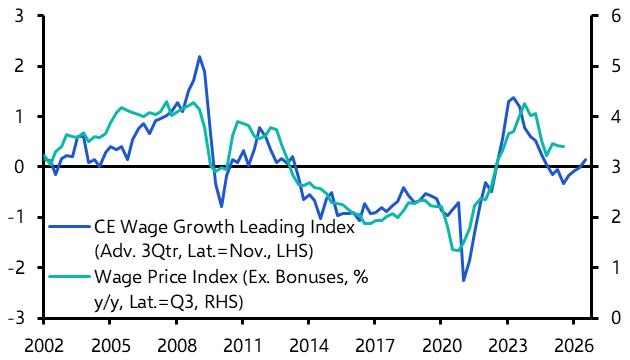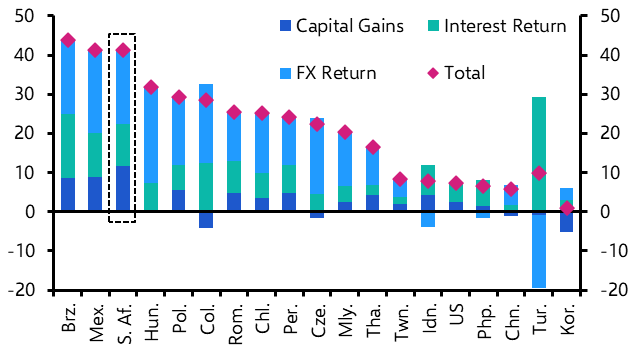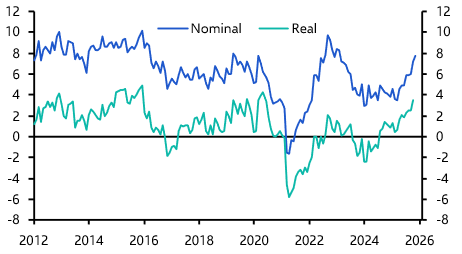Our Long Run service is unique in dedicating a team of economists to consider how big picture themes will shape long-term macro and market outcomes. In a 23rd March online briefing, Group Chief Economist Neil Shearing discussed some of these forces with a group of our senior economists. The following are extracts from that conversation, edited for clarity:
Neil Shearing: I think if we were having this session six weeks ago, when we just had just published our Long Run Outlook, we would have been talking about the legacy of the pandemic. But obviously since then, attention has been turned to what's been happening in Ukraine, and talk us through the economic legacy, as you see it of what's been happening in Ukraine.
Senior Economics Adviser Vicky Redwood: Obviously, Russia's economy is going to take a huge hit in the near term. But, long term, the main implications for Russia will be how the war accelerates the shift towards isolation. And by that I mean a rupturing of economic economic ties with the West. And that's going to further hinder Russia's ability to catch up with more developed economies.
Russia's productivity is still only about 35 to 40%, that of the US levels so there is, in theory, huge scope for good catch-up growth. But even over the last decade before the war, Russia was struggling to close any of that gap due to factors like its ageing infrastructure and the need for wholesale reform across its institutional framework. And now, if we see Russia shift further into isolation, that's going to continue to hamper its ability to adopt technology and know-how from the rest of the world. And if Russia's shift towards isolation is accompanied by more heavy state involvement then that's going to reduce Russia's ability to generate technological progress internally. All of this comes against the backdrop of a big demographic challenge. Russia is one of the countries that set to see the the biggest drop in its working age population over the coming decades. And one legacy of this war might be to reduce Russia's attractiveness for immigrants [and] maybe increase emigration. So if you add all that together, you're looking at Russia struggling to make big productivity gains; it's going to have a contracting working age population and, in the long run, you could see the Russian economy struggling to grow much at all.
In the long run, you could see the Russian economy struggling to grow much at all.Neil Shearing: One of the big things that came out of our Long Run Outlook that we published a few weeks ago was the consensus to believe that China is going to overtake the US at some point – that it will inevitably become the world's largest economy – and we've disagreed with that and taken a different view. [Justin], talk us through why that's the case. Senior Global Economist Justin Chaloner: China's structural slowdown is set to intensify and we think growth is probably going to be weaker than many expect over the coming decades. We don't think China's going to overtake the US and the catch-up is likely to peak around the turn of the next decade, before the US slowly pulls away again. There's a couple of reasons why we think that China's growth is probably going to be weaker than many expect, and why the trend rate of growth will fall to around 2% by 2030. Although it's well known that China has poor demographic prospects, the demographic transition is happening much faster than has probably been widely anticipated. For example, it now looks like we're now at the turning point where China's population is peaking, whereas previously the consensus had been expecting it to peak around 2030. So, China's demographic outlook is a shrinking working age population, and that means that contracting employment will be an increasing drag on growth going forwards, and secondly, the outlook for productivity growth in China is not that stellar. And so China's reached the limits of its investment-led model and centralised policymaking has also resulted in the misallocation of resources going to inefficient state firms. So, we've seen that state intervention is already harming productivity in China and it's likely to become a growing constraint going forward. It becomes harder for state planners to allocate resources effectively as as a country gets richer. So the upshot is that barring a major shift in the reform agenda, China will end up on a slower path of economic growth and is unlikely to overtake the US as the world's largest economy. Watch our briefing 'Long Run Outlook –Assessing the legacies of war and the pandemic' to learn more about the potential legacies of the war in Ukraine and the pandemic.




